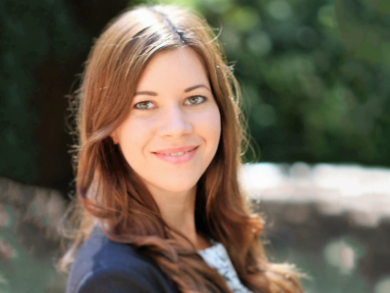Simone Stark, Ph.D. student at the University of Regensburg, Germany, talks to Vera Koester for ChemViews Magazine about her research, the influence of computer technology for lab work in organic and medicinal chemistry, and her future vision of an organic lab.
Can you please briefly explain your research?
The main part of my Ph.D. thesis is the design and synthesis of selective modulators for the ABCG2 transporter. ATP-binding cassette (ABC) transporters, such as P-glycoprotein (P-gp, ABCB1) and ABCG2, are membrane-located proteins that use the energy derived from ATP hydrolysis to efflux diverse compounds across the plasma membrane. Thereby, cells are protected from xenobiotics, biologically active compounds that are found as pollutants in the natural environment.
However, some of these transporters are linked to multidrug resistance (MDR) due to their overexpression in cancer cells. Overexpression leads to decreased intracellular drug levels of many commonly used anticancer drugs, as these drugs are substrates of the ABC efflux pumps and actively removed from the cell. Selective modulators of ABCG2 could block this undesired efflux process.
Since ABCG2 is also highly expressed at the blood-brain barrier, modulators could be also used to increase the oral bioavailability of ABCG2 substrate drugs, which were developed for the central nervous system, but have limited tissue penetration due to efflux at the blood-brain barrier by ABC transporters. In my work, novel modulators are mainly designed by variations of previously designed modulators and the aim is to synthesize and characterize more drug-like analogues.
What challenges do you face in your work? What do you enjoy most?
My work is part of a collaboration with the Department of Pharmaceutical/Medicinal Chemistry II here in Regensburg. It is important to translate results and future plans from a chemist’s to a pharmacist’s perspective and vice versa. It is not always easy to work in an interdisciplinary environment, but it is very interesting and I hope it will prepare me for my future work. I am very happy that I have the opportunity to perform parts of the biological tests with my compounds in the pharmacy department myself.
What I enjoy most is that I have a lot of freedom regarding my research and that I can take advantage of a lot of facilities in our chemistry and pharmacy department. Furthermore, I had the possibility to go abroad two times – to India and Colombia – and to meet people from all over the world as our research group is very international.
How is synthesis planning changing? Are digitalization and big data topics?
Databases such as SciFinder are fundamental for today’s research. Regarding digitalization and big data, I first realized what is possible nowadays with ChemPlanner. At the beginning of this year, together with some members of our chemistry department, I had the chance to test this computer-aided synthesis design tool for several weeks. For an organic chemist like me, this tool can speed up the process regarding synthesis design and recommends the best synthetic route to yield your desired target molecule. Without this tool, researchers have to spend hours looking through SciFinder and checking which starting materials are available and how costly they are. ChemPlanner will do all this within minutes for you, which increases the speed of your research process.
During my Ph.D., I generated huge amounts of data in the form of spectra and assay results. I used different devices with different software, so the exchange and transformation of data between several programs and a safe and well-arranged archival storage of the data were challenging. I never used an electronic laboratory journal, instead I wrote everything down by hand, so I have no experience with what is possible here today.
What would be your vision of an organic or medicinal chemistry lab in 50 years?
I would guess that a chemist would rather use his mind than his hands, as robots will perform almost everything – handling compound libraries, automated re-ordering of chemicals, weighing, choosing the right flask size, and so on, thereby hopefully preserving our resources and minimizing waste. With these developments, chemists will also have to develop new skills in order to adapt.
Regarding medicinal chemistry, I envisage that computer-based drug discovery will be a big topic, making testing in cell-lines and maybe even animals redundant and allowing a compound’s activity, selectivity, and safety to be predicted in silico.
What would you like to be doing ten years from now?
I would be happy to work in R&D in the pharmaceutical industry, preferably in the development of novel drugs from natural products.
What do you do in your spare time?
I enjoy meeting friends and family, reading books, traveling, and cooking.
Thank you for the interview.
 Simone Alexandra Stark studied chemistry at the University of Regensburg, Germany. Since 2013, she has been working on her Ph.D. in the group of Burkard König in Regensburg in the field of medicinal chemistry. Currently, she is performing research work in Bogotá, Colombia.
Simone Alexandra Stark studied chemistry at the University of Regensburg, Germany. Since 2013, she has been working on her Ph.D. in the group of Burkard König in Regensburg in the field of medicinal chemistry. Currently, she is performing research work in Bogotá, Colombia.
Selected Publications
- ABCG2/BCRP: Specific and Non-Specific Modulators,
Diana Peña-Solórzano, Simone Alexandra Stark, Burkhard König, Cesar Augusto Sierra, Cristian Ochoa-Puentes,
Med. Res. Rev. 2016.
DOI: 10.1002/med.21428 - Wiley ChemPlanner predicts experimentally verified synthesis routes in medicinal chemistry (Whitepaper),
Simone Alexandra Stark, Reinhard Neudert, Richard Threlfall,
Wiley, 2016.




